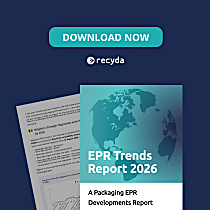Australian researchers discover common fungi can breakdown PP

20 Apr 2023 --- Researchers from The University of Sydney, Australia, have utilized two strains of fungi found in soils to break down PP plastic to find an alternative solution for the material’s low recycling rate.
“Plastic pollution is by far one of the biggest waste issues of our time. The vast majority of it isn’t adequately recycled,” says Amira Farzana Samat, a graduate student at The University of Sydney.
PP accounts for roughly 28% of the world’s plastic waste and has a recycling rate of 1%. The researchers used Aspergillus terreus and Engyodontium album mushrooms to break down the material with success rates of 21% being “eaten” over 30 days of incubation, 25-27% over 90 days and completely broken down after 140 days.

“Theoretically, this could help remediate some of the waste currently made by the packaging industry. However, a better approach would be for this industry to move away from plastic,” Dee Carter, professor at The University of Sydney, tells PackagingInsights.
 Engyodontium album (Image credit: Amira Samat). Scaling difficulties
Engyodontium album (Image credit: Amira Samat). Scaling difficulties
The researchers measured the weight loss of PP granule (GPP), film (FPP) and metalized film (MFPP) after 30, 60 and 90 days of incubation. The gravimetric weight loss of pre-treated PP samples was higher than the control for both A. terreus and E. album.
The fungi were pre-treated with UV, heat or Fenton’s reagent, which is a common preliminary step before contemplating the biological approach in research. UV-treated MFPP, FPP and GPP incubated with A. terreus and heat-treated GPP and FPP incubated with E. album demonstrated increasing gravimetric weight loss percentage trend to incubation days.
“We currently need to pre-treat the plastic to enable the fungi to degrade it, which may make scale-up difficult. At present, we don’t know if this might also cause problems with effluent or gaseous waste. There is more work to be done before we can expect fungi to solve the plastic waste problem,” adds Carter.
Hypothetically, the gravimetric weight loss trend will increase proportionally to incubation days.
The research demonstrates that A. terreus and E. album can grow on, change and utilize PP as a carbon source with pre-treatment aid, promoting the biological pathways for plastic waste treatment.
The findings were published in npj: Materials Degradation.
rPP problems
The researchers say PP is infrequently recycled because of its short life as a packaging material. Other materials and plastics often contaminate it, requiring new recycling methods.
“Most plastics are very stable and are not readily degraded when they enter the ground as waste,” writes the study. Plastics take decades to biodegrade and are significant terrestrial and marine ecosystem pollutants.
“As they are assumed to be recalcitrant, it is essential to discover ways to degrade these difficult-to-recycle compounds, including understanding the optimal environmental conditions and the possible biological mechanisms involved in their deterioration and degradation,” continues the report. Mushrooms were found to degrade PP over time with an increasing slope of time to breakdown.
Mushrooms were found to degrade PP over time with an increasing slope of time to breakdown.
According to a study last year, more than 400 microorganisms that degrade plastic naturally were found. Fungi have the versatility and ability to degrade synthetic substrates with their enzymes.
“Recent studies suggest some fungi may even degrade some of the ‘forever chemicals’ like PFAS, but the process is slow and not yet well understood. There is also evidence that the amount of plastic accumulated in the ocean is less than expected based on production and disposal levels with speculation that marine fungi may have degraded some of this ‘missing’ plastic,” explains Carter.
“One big question our result has raised is – what are the naturally occurring conditions which can fast track the degradation of plastics? We seek to explore further the role of biological processes offered by fungi and other microorganisms,” adds Ali Abbas, from the School of Chemical and Molecular Engineering and chief circular engineer at Circular Australia.
Mushroom use in packaging
The researchers hope their method could one day reduce the vast amount of plastic polluting the environment and lead to a greater understanding of how plastic pollution might biodegrade naturally under certain conditions.
“We need to support the development of disruptive recycling technologies that improve the circularity of plastics, especially those technologies that are driven by biological processes like in our study,” says Abbas.
“I think fungi could have a bright future for creating packaging. Fungi grow rapidly on simple substrates, including on waste streams from other industries (food waste), and can form very strong structures. These can be grown into molded shapes and could replace polystyrene in packing large, delicate items,” concludes Carter.
By Sabine Waldeck











